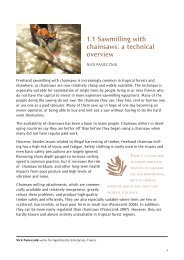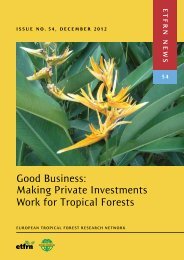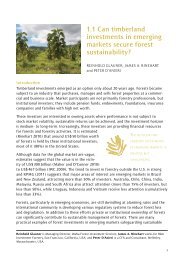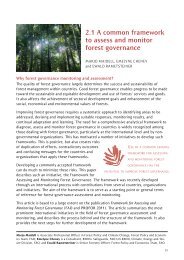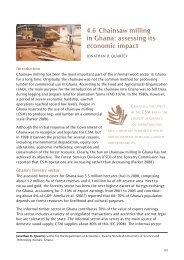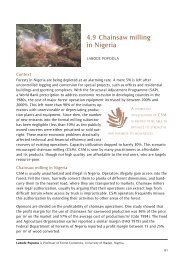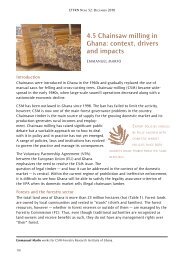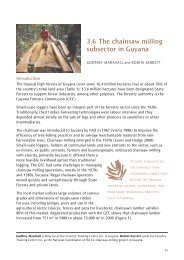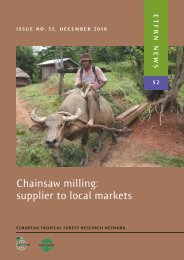Chainsaw milling: supplier to local markets - European Tropical ...
Chainsaw milling: supplier to local markets - European Tropical ...
Chainsaw milling: supplier to local markets - European Tropical ...
Create successful ePaper yourself
Turn your PDF publications into a flip-book with our unique Google optimized e-Paper software.
ETFRN NEws 52: DEcEmbER 2010<br />
(lao pDr, indonesia, Cameroon, DrC, Gabon, bolivia). as a result, opera<strong>to</strong>rs often prefer<br />
<strong>to</strong> work informally than <strong>to</strong> comply with burdensome bureaucratic procedures.<br />
in most countries chainsaw <strong>milling</strong> is associated with illegal forest activities. Even when<br />
Csm is authorized, its activities are often difficult <strong>to</strong> moni<strong>to</strong>r due <strong>to</strong> the large number<br />
of people involved and the small size and mobility of its operations. The absence of Csm<br />
regulations and limited enforcement capacity exacerbate the problems of insufficient<br />
moni<strong>to</strong>ring. in some countries, unclear or randomly enforced regulations give rise <strong>to</strong><br />
illegal and corrupt practices where government officials derive personal benefits from<br />
Csm activities (philippines 2.6; DrC 4.1 and 4.4; Ghana 4.5; Cameroon 4.1).<br />
Guyana is an example where Csm is a legal and important subsec<strong>to</strong>r of the forest<br />
industry that supports rural livelihoods. The government has set up a relatively simple<br />
and workable regula<strong>to</strong>ry system for small-scale producers (office of Climate Change 3.5;<br />
marshall and kerrett 3.6).<br />
in bolivia illegal Csm activities decreased significantly after the introduction of the<br />
1996 forest law. The legislation offered chainsaw millers a legal framework and gave<br />
land-owners the chance <strong>to</strong> benefit from their forest resource. This access allowed for the<br />
development of small-scale processing of logs transported by trac<strong>to</strong>rs. The processing<br />
requires less capital than conventional logging and is more efficient and less strenuous<br />
than Csm (benneker 3.1).<br />
in some countries (liberia, nigeria), Csm is not allowed but is considered quasi-legal and<br />
is <strong>to</strong>lerated in practice, because of the lack of economic incentive <strong>to</strong> invest in the formal<br />
sawmill industry due <strong>to</strong> the depletion of timber resources (nigeria) and the unavailability<br />
of other sources of timber (liberia).<br />
Main drivers of chainsaw <strong>milling</strong><br />
Demand for cheap wood in <strong>local</strong> <strong>markets</strong><br />
The <strong>local</strong> demand for cheap lumber was identified as the main driver of Csm in each<br />
country covered in this ETFRN News. This demand is not being met by other sources of<br />
lumber.<br />
in countries where Csm is illegal, it is still viewed as a legitimate practice by the majority<br />
of the stakeholders involved in the wood-based industry at the <strong>local</strong> level (andrian<strong>to</strong>,<br />
obidzinski and komarudin 2.2; marfo 4.5; kamara et al. 4.8). Consumers accept lowquality<br />
chainsawn lumber because of its low price (palacios and malessa 3.4; Quartey 4.6;<br />
kambugu, banana and odokonyero 4.11). The lack of incentives — such as price premiums<br />
for legal, higher-quality timber on the <strong>local</strong> market — and the abundance of logs keep<br />
Csm prices low and discourage people from using <strong>milling</strong> attachments (pasiecznik 1.1;<br />
palacios and malessa 3.4). it remains unknown whether higher requirements would result<br />
in a sustained demand for better quality products or just foster more illegal harvesting, as<br />
in Cameroon (lescuyer et al. 4.1).<br />
x



